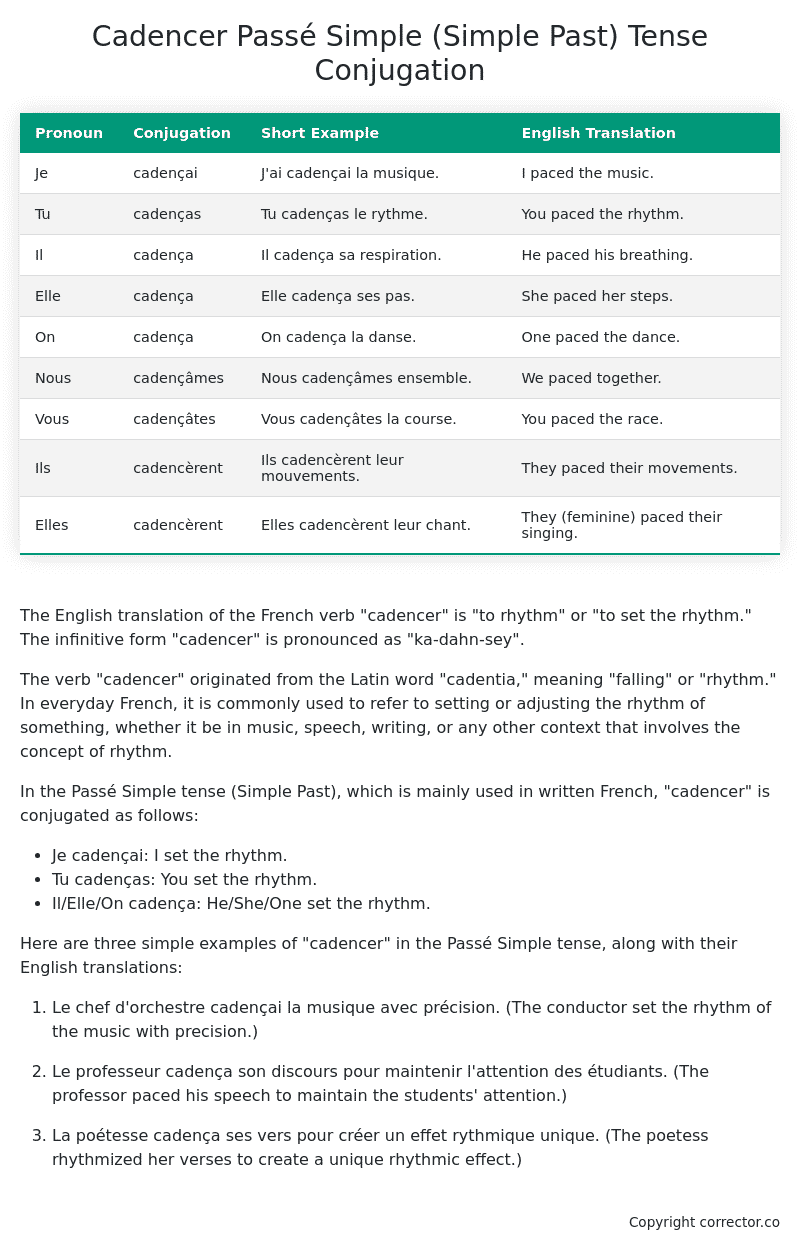Passé Simple (Simple Past) Tense Conjugation of the French Verb cadencer
Introduction to the verb cadencer
The English translation of the French verb “cadencer” is “to rhythm” or “to set the rhythm.” The infinitive form “cadencer” is pronounced as “ka-dahn-sey”.
The verb “cadencer” originated from the Latin word “cadentia,” meaning “falling” or “rhythm.” In everyday French, it is commonly used to refer to setting or adjusting the rhythm of something, whether it be in music, speech, writing, or any other context that involves the concept of rhythm.
In the Passé Simple tense (Simple Past), which is mainly used in written French, “cadencer” is conjugated as follows:
- Je cadençai: I set the rhythm.
- Tu cadenças: You set the rhythm.
- Il/Elle/On cadença: He/She/One set the rhythm.
Here are three simple examples of “cadencer” in the Passé Simple tense, along with their English translations:
-
Le chef d’orchestre cadençai la musique avec précision.
(The conductor set the rhythm of the music with precision.) -
Le professeur cadença son discours pour maintenir l’attention des étudiants.
(The professor paced his speech to maintain the students’ attention.) -
La poétesse cadença ses vers pour créer un effet rythmique unique.
(The poetess rhythmized her verses to create a unique rhythmic effect.)
Table of the Passé Simple (Simple Past) Tense Conjugation of cadencer
| Pronoun | Conjugation | Short Example | English Translation |
|---|---|---|---|
| Je | cadençai | J’ai cadençai la musique. | I paced the music. |
| Tu | cadenças | Tu cadenças le rythme. | You paced the rhythm. |
| Il | cadença | Il cadença sa respiration. | He paced his breathing. |
| Elle | cadença | Elle cadença ses pas. | She paced her steps. |
| On | cadença | On cadença la danse. | One paced the dance. |
| Nous | cadençâmes | Nous cadençâmes ensemble. | We paced together. |
| Vous | cadençâtes | Vous cadençâtes la course. | You paced the race. |
| Ils | cadencèrent | Ils cadencèrent leur mouvements. | They paced their movements. |
| Elles | cadencèrent | Elles cadencèrent leur chant. | They (feminine) paced their singing. |
Other Conjugations for Cadencer.
Le Present (Present Tense) Conjugation of the French Verb cadencer
Imparfait (Imperfect) Tense Conjugation of the French Verb cadencer
Passé Simple (Simple Past) Tense Conjugation of the French Verb cadencer (You’re reading it right now!)
Passé Composé (Present Perfect) Tense Conjugation of the French Verb cadencer
Futur Simple (Simple Future) Tense Conjugation of the French Verb cadencer
Futur Proche (Near Future) Tense Conjugation of the French Verb cadencer
Plus-que-parfait (Pluperfect) Tense Conjugation of the French Verb cadencer
Passé Antérieur (Past Anterior) Tense Conjugation of the French Verb cadencer
Futur Antérieur (Future Anterior) Tense Conjugation of the French Verb cadencer
Subjonctif Présent (Subjunctive Present) Tense Conjugation of the French Verb cadencer
Subjonctif Passé (Subjunctive Past) Tense Conjugation of the French Verb cadencer
Subjonctif Imparfait (Subjunctive Imperfect) Tense Conjugation of the French Verb cadencer
Subjonctif Plus-que-parfait (Subjunctive Pluperfect) Tense Conjugation of the French Verb cadencer
Conditionnel Présent (Conditional Present) Tense Conjugation of the French Verb cadencer
Conditionnel Passé (Conditional Past) Tense Conjugation of the French Verb cadencer
Conditionnel Passé II (Conditional Past II) Tense Conjugation of the French Verb cadencer
L’impératif Présent (Imperative Present) Tense Conjugation of the French Verb cadencer
L’impératif Passé (Imperative Past) Tense Conjugation of the French Verb cadencer
L’infinitif Présent (Infinitive Present) Tense Conjugation of the French Verb cadencer
L’infinitif Passé (Infinitive Past) Tense Conjugation of the French Verb cadencer
Le Participe Présent (Present Participle) Tense Conjugation of the French Verb cadencer
Le Participe Passé (Past Participle) Tense Conjugation of the French Verb cadencer
Struggling with French verbs or the language in general? Why not use our free French Grammar Checker – no registration required!
Get a FREE Download Study Sheet of this Conjugation 🔥
Simply right click the image below, click “save image” and get your free reference for the cadencer Passé Simple tense conjugation!

Cadencer – About the French Passé Simple (Simple Past) Tense
Formation
Usage
Narration
Historical Context
Interactions with other tenses
Passé Composé
Imparfait
Conditional and Subjunctive
Summary
I hope you enjoyed this article on the verb cadencer. Still in a learning mood? Check out another TOTALLY random French verb conjugation!


